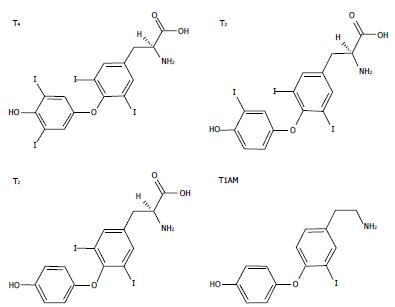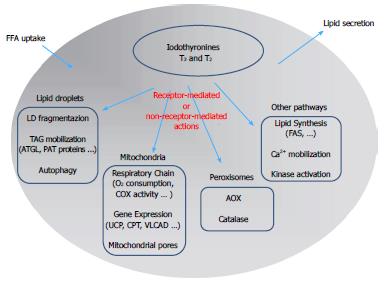Copyright
©2014 Baishideng Publishing Group Co.
World J Hepatol. Apr 27, 2014; 6(4): 169-177
Published online Apr 27, 2014. doi: 10.4254/wjh.v6.i4.169
Published online Apr 27, 2014. doi: 10.4254/wjh.v6.i4.169
Figure 1 The chemical structures of three biologically active iodothyronines and one derivative: thyroxine, 3,3’,5-triiodothyronine, 3,5-diiodothyronine and 3-iodothyronamine.
T4: Thyroxine; T3: 3,3’,5-triiodothyronine; T2: 3,5-diiodothyronine; T1AM: 3-iodothyronamine.
Figure 2 Schematic representation of the mechanisms underlying the control of lipid metabolism by iodothyronines in the hepatic cell: A summary of the possible signaling pathways involved in iodothyronine actions is presented.
The classic “receptor-mediated” pathway describes the action of iodothyronines through the thyroid hormone receptors (TR). The “non receptor-mediated” pathway occurs through the interaction of iodothyronines with different cellular targets. FFA: Free fatty acids; LD: Lipid droplet; AOX: Acyl-CoA oxidase; ATGL: Adipose triglyceride lipase; CPT: Carnitine palmitoyl-transferase 1; FAS: fatty acid synthase.
-
Citation: Vergani L. Lipid lowering effects of iodothyronines:
In vivo andin vitro studies on rat liver. World J Hepatol 2014; 6(4): 169-177 - URL: https://www.wjgnet.com/1948-5182/full/v6/i4/169.htm
- DOI: https://dx.doi.org/10.4254/wjh.v6.i4.169










